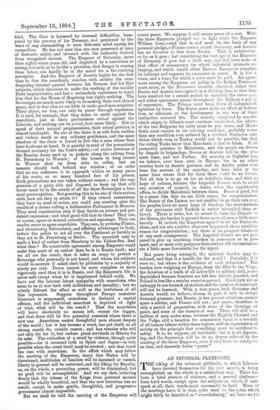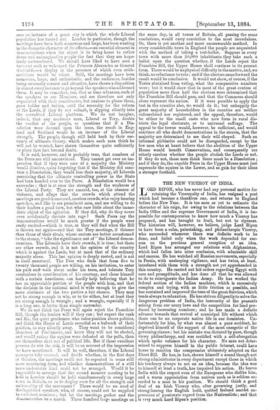AN INFORMAL PLLBISCITE. T HE taking of the informal plebiscite, to
which Liberals have devoted themselves for the past month, is being accomplished on the whole in a satisfactory way. There has been a total absence of violence, and a general abstinence from hard words, except upon the subjects on which, if men speak at all, their words must necessarily be hard. None of the meetings have, it is true, quite risen to the point which might fairly be described as "overwhelming," nor have we yet
seen an instance of a great city in which the whole Liberal population has turned out. London in particular, though the meetings have been both numerous and large, has been wanting in the dramatic character of its effects,—an essential element in demonstrations when the object is to bring home to rather dense and unimaginative people the fact that they are hope- lessly outnumbered. We should have liked to have seen a turn-out such as welcomed the Princess Alexandra or General Gaiibaldi,—a display in the presence of which even arith- meticians would be silent. Still, the meetings have been numerous, large, and enthusiastic, and the audiences, besides being unusually earnest and attentive, have shown a disposition in almost every instance to go beyond the speakers who addressed them. It may be remarked, too, that as time advances, such of the speakers as are Members, and are therefore not only acquainted with their constituents, but anxious to please them, grow bolder and bolder, until the necessity for the reform of the Lords, if they do not submit, is slipping silently into the accredited Liberal platform. We do not imagine, indeed, that any moderate man, Liberal or Tory, doubts the verdict of the people, or questions that if a Dis- solution were decreed upon the issue, the result in Eng- land and Scotland would be an increase of the Liberal strength. The people, though still held back by their cer- tainty of ultimate victory, which makes each man think he will not be wanted, have shown themselves quite sufficiently • to place that fact beyond doubt.
It is said, however, and is probably true, that numbers of the Peers are still unconvinced. They cannot get over an im- pression that if they were sure of a majority the Ministry would dissolve, quite forgetting that if the Ministry did sanc- tion a Dissolution, they would lose their majority, all Liberals perceiving that the ultimate controlling power in the State had been handed over to the Peers. A Dissolution would be a surrender ; that is at once the strength and the weakness of the Liberal Party. They are amazed, too, at the absence of violence, and allege that the crowds which attend the meetings are good-humoured, careless crowds, who enjoy hearing speeches, and like to see prominent men, and are willing to do their leaders a good turn, but who care little about the imme- diate object of the agitation. If they did, why do they never even accidentally deviate into rage ? Such Peers say the demonstrations would be much greater if the people were really excited—which is true, as they will find when the Bill is thrown out again—and that the Tory meetings, if thinner than those of their rivals, whose orators are better accustomed to the stump, " take the significance out of" the Liberal demon- strations. The Liberals have their crowds, it is true; but there are other crowds, and it is not the opinion of the country which is against the Lords, but at most that of the ordinary majority alone. This last opinion is deeply rooted, and is not in itself unnatural. The Peer who finds that from five to twenty thousand people are willing, on his invitation, to enter his park and- walk about under his trees, and tolerate Tory resolutions in consideration of his courtesy, and cheer himself with a certain heartiness, can hardly help believing that he has an appreciable portion of the people with him, and that the division in the national mind is wide enough to give the more obstinate of the two parties a fair chance. They may not be strong enough to win, or to tie either, but at least they are strong enough to wrangle ; and a wrangle, especially if it is a long one, is better than simple surrender.
We do not think the Peers will again reject the Franchise Bill, though the leaders will if they can ; but expect the rank and file, the quiet gentlemen who value position above politics, and think the House of Lords essential as a bulwark of their position, to stay silently away. They want to be considered Members of Parliament, and know they will not be elected, and would rather the squires were defeated at the polls, than see themselves shut out of political life. But if these excellent persons do run the risk, it will be on account of the impression we have mentioned. It will be well, therefore, if the Liberal managers take counsel, and decide whether, in the first days of October, the meetings could not be repeated in some still more convincing form, and whether demonstrations of a still more undeniable kind could not be arranged. Would it be impossible to arrange that the second monster meeting to be h,la in London should be held simultaneously in every large town in Britain, so as to display once for all the strength and universality of the movement ? There would be no need of distinguished speakers, who, of course, could not be supplied in sufficient numbers ; but let the meetings gather and the demonstration be a march. Three hundred large meetings on
the same day, in all towns of Britain, all passing the same resolutions, would carry conviction to the most incredulous. Or, there is yet another and more unanswerable method. In every considerable town in England the people are acquainted with the method of taking a test-ballot. Suppose in every town with more than 20,000 inhabitants they take such a ballot upon the question whether, if the Lords reject the Franchise Bill, the Upper House shall continue in its present form. There would be no physical difficulty in the matter, and, we think, no reluctance to vote ; and if the electors came forward the result would be conclusive. It would not show, of course, if the Tories abstained from voting, what the comparative numbers were ; but it would show that in most of the great centres of population more than half the electors were determined that the Franchise Bill should pass, and that the Commons should alone represent the nation. If it were possible to apply the test in the counties also, we would do it ; but unhappily the great majority of householders in the counties are neither enfranchised nor registered, and the appeal, therefore, would be either to the small caste who now form in rural dis- tricts the legal electorate, or to universal suffrage. The appeal to the towns would, however, be sufficient, and would convince all who doubt demonstrations in the streets, that the majority are determined to see their will obeyed. Such an informal plebiscite could not be disregarded, except by the few men who at heart believe that the abolition of the Upper House would benefit Conservatism, and consequently are utterly careless whether the people abolish the Lords or not. If they do not, these men think there must be a Dissolution; and if they do, the capable Peers in the Upper House must just supersede the squires in the Lower, and so gain for their ideas a stronger foothold.



































 Previous page
Previous page